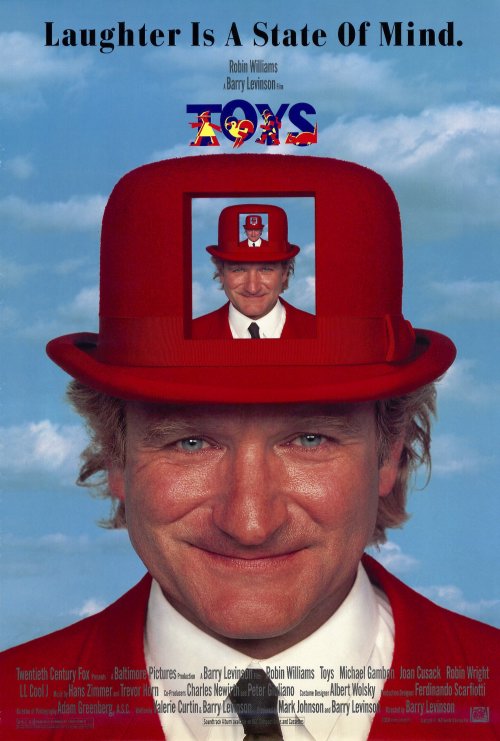 The very definition of a passion project gone wrong, a (very) long-in-the-works 1992 film that had its inception in the 1970s. TOYS was intended to be the directorial debut of Barry Levinson, but its journey to the screen ended up taking over a decade, during which time it went from what has been described as a modest drama about competing toy manufacturers to an overtly surreal, design-heavy fever dream—as Levinson said about TOYS in 1992, “I’ve pushed the design element further and further, so the movie has become stranger and stranger as time goes on.”
The very definition of a passion project gone wrong, a (very) long-in-the-works 1992 film that had its inception in the 1970s. TOYS was intended to be the directorial debut of Barry Levinson, but its journey to the screen ended up taking over a decade, during which time it went from what has been described as a modest drama about competing toy manufacturers to an overtly surreal, design-heavy fever dream—as Levinson said about TOYS in 1992, “I’ve pushed the design element further and further, so the movie has become stranger and stranger as time goes on.”
“I’ve pushed the design element further and further, so the movie has become stranger and stranger as time goes on.”
I think it goes without saying that the finished film, a $43 million Christmas release, was a box office flop, despite the presence of Robin Williams and a trailer that remains better known than the movie it advertised. Said trailer consists of Williams in a field doing an extended comedy riff on all things toy-related, and disparaging the preceding trailer (for which reason TOYS’ distributor Twentieth Century Fox issued memos imploring projectionists not to run its trailer first; in the projection booth in which I was employed in ‘92 we followed that dictum, but made sure that the trailer preceding the TOYS preview was for another Twentieth Century Fox release).
Williams plays Leslie, a goof who dresses in brightly colored suits and top hats. He’s the son of Kenneth Zevo (Donald O’Connor), the recently deceased owner of the Idaho based Zevo Toy factory. This place was apparently described in an early screenplay draft as “little more than a non-descript factory building,” but is incarnated onscreen as an elaborate surrealist funhouse located in the middle of a vast field.
Concerned that Leslie is too immature for a leadership position, the dying Kenneth selects his younger brother Leland (Michael Gambon), a Lieutenant General, to run the factory. Leland, together with his son Patrick (LL Cool J), takes to creating war toys he plans to sell to the US military. Leslie opposes this, and together with his eccentric (robotic, to be exact) sister Alsatia (Joan Cusak) and girlfriend Gwen (Robin Wright), sends an army of dolls into battle against Leland’s war toys.
This film’s simplistic mindset was one that was quite prevalent in Hollywood during the late eighties and early nineties, which held that kidhood was sacrosanct and getting in touch with one’s “inner child” was all-important. The children seen in this movie are perpetually smiling, high-spirited beings that exist only to laugh and play—and be corrupted by nefarious grown-up influences.
The children seen in this movie are perpetually smiling, high-spirited beings that exist only to laugh and play—and be corrupted by nefarious grown-up influences.
That Levinson was overwhelmed by the film’s visuals is obvious, but what’s surprising is how lousy his screenplay, written in collaboration with his ex-wife Valerie Curtin, truly is. In the 1970s and early 80s Levinson and Curtain were among the top screenwriters in Hollywood (the movies made from their scripts, such as …AND JUSTICE FOR ALL, INSIDE MOVES and BEST FRIENDS, didn’t always click, but the writing was usually impeccable) and their TOYS screenplay dates back to the their heyday. I’m assuming it was ruined by all the rewrites.
That Levinson was overwhelmed by the film’s visuals is obvious, but what’s surprising is how lousy his screenplay, written in collaboration with his ex-wife Valerie Curtin, truly is.
Characterization is nonexistent, with Leslie offering shockingly little in the way of personality outside Robin Williams’ rapid fire ad libs (with Levinson having reportedly left the camera constantly running so he could capture as much of Williams’ banter as he could) and Robin Wright’s Gwen existing solely (in the words of Jennifer Jason Leigh) to prove that the leading man is heterosexual. Joan Cusak comes off best as Alsatia, the non-human nature of whom fits (for once) Cusak’s uber-quirky demeanor. Also featured are small roles by Yeardley Smith (Bart Simpson herself), Debi Mazar and a debuting Jamie Foxx.
The Magritte-inspired surrealist wonderland created by Levinson and production designer Ferdinando Scarfiotti (of THE CONFORMIST, THE LAST EMPEROR and SCARFACE) is nearly worth the price of admission. Levinson isn’t especially adept at surreal filmmaking, but conjures some entrancing imagery—a family of toy ducks crossing an extremely bumpy indoor road, an elephant statue (taking the place of a tombstone) that blows bubbles and floats around, rooms whose walls collapse in on themselves in cubist formations (Leslie/Williams: “We’re being attacked by a crossword puzzle!”) and a war in which sentient dolls blow each other apart, a scene that despite a barrage of distracting visual quirks (step framing, etc.) is quite intense, and sparked a mini-outcry from viewers concerned that kids might be traumatized. Many children were traumatized, I’d guess, by this allegedly kid-friendly fantasia, which works best as a grown-up spectacle viewed with appropriate chemical enhancement.
Vital Statistics
TOYS
Twentieth Century Fox
Director: Barry Levinson
Producers: Mark Johnson, Barry Levinson
Screenplay: Barry Levinson, Valerie Curtin
Cinematography: Adam Greenberg
Editing: Stu Linder
Cast: Robin Williams, Michael Gambon, Joan Cusak, Robin Wright, LL Cool J, Donald O’Connor, Arthur Malet, Jack Warden, Debi Mazar, Wendy Melvoin, Julio Oscar Mechoso, Jamie Foxx, Shelly Desai, Blake Clark, Art Metrano, Tommy Townsend, Clinton Allmon, Kate Benton, Steve Park, Julie Hayden, Yeardley Smith
